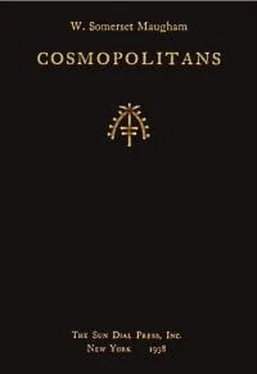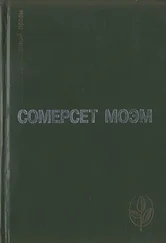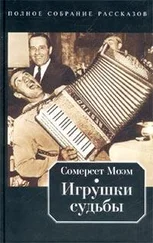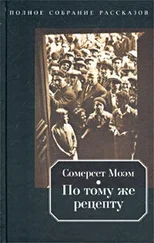Уильям Моэм - Cosmopolitans
Здесь есть возможность читать онлайн «Уильям Моэм - Cosmopolitans» весь текст электронной книги совершенно бесплатно (целиком полную версию без сокращений). В некоторых случаях можно слушать аудио, скачать через торрент в формате fb2 и присутствует краткое содержание. Город: New York, Год выпуска: 1938, Издательство: The Sun Dial Press, INC., Жанр: Классическая проза, short_story, на английском языке. Описание произведения, (предисловие) а так же отзывы посетителей доступны на портале библиотеки ЛибКат.
- Название:Cosmopolitans
- Автор:
- Издательство:The Sun Dial Press, INC.
- Жанр:
- Год:1938
- Город:New York
- ISBN:нет данных
- Рейтинг книги:5 / 5. Голосов: 1
-
Избранное:Добавить в избранное
- Отзывы:
-
Ваша оценка:
- 100
- 1
- 2
- 3
- 4
- 5
Cosmopolitans: краткое содержание, описание и аннотация
Предлагаем к чтению аннотацию, описание, краткое содержание или предисловие (зависит от того, что написал сам автор книги «Cosmopolitans»). Если вы не нашли необходимую информацию о книге — напишите в комментариях, мы постараемся отыскать её.
Cosmopolitans — читать онлайн бесплатно полную книгу (весь текст) целиком
Ниже представлен текст книги, разбитый по страницам. Система сохранения места последней прочитанной страницы, позволяет с удобством читать онлайн бесплатно книгу «Cosmopolitans», без необходимости каждый раз заново искать на чём Вы остановились. Поставьте закладку, и сможете в любой момент перейти на страницу, на которой закончили чтение.
Интервал:
Закладка:
“In dis country you can’t eat a ting onless it’s tasty,” said the skipper.
“De only way to keep yourself up in dis country is to eat hearty,” said the chief.
They were the greatest friends, all four of them; they were like schoolboys together, playing absurd little pranks with one another. They knew each other’s jokes by heart and no sooner did one of them start the familiar lines than he would splutter with laughter so violently, the heavy shaking laughter of the fat man, that he could not go on. And then the others began to laugh too. They rolled about in their chairs, and grew redder and redder, hotter and hotter, till the skipper shouted for beer, and each, gasping but happy, drank his bottle in one enchanted draught. They had been on this run together for five years and when, a little time before, the chief officer had been offered a ship of his own he refused it. He would not leave his companions. They had made up their minds that when the first of them retired they would all retire.
“All friends and a good ship. Good grub and good beer. Vot can a sensible man vant more?”
At first they were a little stand-offish with me. Although the ship had accommodation for half a dozen passengers, they did not often get any, and never one whom they did not know. I was a stranger and a foreigner. They liked their bit of fun and did not want anyone to interfere with it. But they were all of them very fond of bridge, and on occasion the chief and the engineer had duties that prevented one or the other playing. They were willing to put up with me when they discovered that I was ready to make a fourth whenever I was wanted. Their bridge was as incredibly fantastic as they were. They played for infinitesimal stakes, five cents a hundred: they did not want to win one another’s money, they said, it was the game they liked. But what a game! Each was wildly determined to play the hand and hardly one was dealt without at least a small slam being declared. The rule was that if you could get a peep at somebody else’s cards you did, and if you could get away with a revoke you told your partner when there was no danger it could be claimed and you both roared with laughter till the tears rolled down your fat cheeks. But if your partner had insisted on taking the bid away from you and had called a grand slam on five spades to the queen, whereas you were positive on your seven little diamonds you could have made it easily, you could always score him off by redoubling without a trick in your hand. He went down two or three thousand and the glasses on the table danced with the laughter that shook your opponents.
I could never remember their difficult Dutch names, but knowing them anonymously as it were, only by the duties they performed, as one knows the characters Pantaloon, Harlequin, and Punchinello, of the old Italian comedy, added grotesquely to their drollery. The mere sight of them, all four together, set you laughing, and I think they got a good deal of amusement from the astonishment they caused in strangers. They boasted that they were the four most famous Dutchmen in the East Indies. To me not the least comic part of them was their serious side. Sometimes late at night, when they had given up all pretence of still wearing their uniforms, and one or the other of them lay by my side on a long chair in a pyjama jacket and a sarong, he would grow sentimental. The chief engineer, due to retire soon, was meditating marriage with a widow whom he had met when last he was home and spending the rest of his life in a little town with old red-brick houses on the shores of the Zuyder Zee. But the captain was very susceptible to the charms of the native girls and his thick English became almost unintelligible from emotion when he described to me the effect they had on him. One of these days he would buy himself a house on the hills in Java and marry a pretty little Javanese. They were so small and so gentle and they made no noise, and he would dress her in silk sarongs and give her gold chains to wear round her neck and gold bangles to put on her arms. But the chief mocked him.
“Silly all dat is. Silly. She goes mit all your friends and de house boys and everybody. By de time you retire, my dear, vot you’ll vant vill be a nurse, not a vife.”
“Me?” cried the skipper. “I shall want a vife ven I’m eighty!”
He had picked up a little thing last time the ship was at Macassar and as we approached that port he began to be all of a flutter. The chief officer shrugged fat and indulgent shoulders. The captain was always losing his head over one brazen hussy after another, but his passion never survived the interval between one stop at a port and the next, and then the chief was called in to smooth out the difficulties that ensued. And so it would be this time.
“De old man suffers from fatty degeneration of de heart. But so long as I’m dere to look after him not much harm comes of it. He vastes his money and dat’s a pity, but as long as he’s got it to vaste, why shouldn’t he?”
The chief officer had a philosophic soul.
At Macassar then I disembarked, and bade farewell to my four fat friends.
“Make another journey with us,” they said. “Come back next year or the year after. You’ll find us all here just the same as ever.”
A good many months had passed since then and I had wandered through more than one strange land. I had been to Bali and Java and Sumatra; I had been to Cambodia and Annam; and now, feeling as though I were home again, I sat in the garden of the Van Dorth Hotel. It was cool in the very early morning and having had breakfast I was looking at back numbers of the Straits Times to find out what had been happening in the world since last I had been within reach of papers. Nothing very much. Suddenly my eyes caught a headline: The Utrecht Tragedy. Supercargo and Chief Engineer. Not Guilty. I read the paragraph carelessly and then I sat up. The Utrecht was the ship of my four fat Dutchmen and apparently the supercargo and the chief engineer had been on trial for murder. It couldn’t be my two fat friends. The names were given, but the names meant nothing to me. The trial had taken place in Batavia. No details were given in this paragraph; it was only a brief announcement that after the judges had considered the speeches of the prosecution and of the defence their verdict was as stated. I was astounded. It was incredible that the men I knew could have committed a murder. I could not find out who had been murdered. I looked through back numbers of the paper. Nothing.
I got up and went to the manager of the hotel, a genial Dutchman, who spoke admirable English, and showed him the paragraph.
“That’s the ship I sailed on. I was in her for nearly a month. Surely these fellows aren’t the men I knew. The men I knew were enormously fat.”
“Yes, that’s right,” he answered. “They were celebrated all through the Dutch East Indies, the four fattest men in the service. It’s been a terrible thing. It made a great sensation. And they were friends. I knew them all. The best fellows in the world.”
“But what happened?”
He told me the story and answered my horrified questions. But there were things I wanted to know that he couldn’t tell me. It was all confused. It was unbelievable. What actually had happened was only conjecture. Then someone claimed the manager’s attention and I went back to the garden. It was getting hot now and I went up to my room. I was strangely shattered.
It appeared that on one of the trips the captain took with him a Malay girl that he had been carrying on with and I wondered if it was the one he had been so eager to see when I was on board. The other three had been against her coming-what did they want with a woman in the ship? it would spoil everything-but the captain insisted and she came. I think they were all jealous of her. On that journey they didn’t have the fun they generally had. When they wanted to play bridge the skipper was dallying with the girl in his cabin; when they touched at a port and went ashore the time seemed long to him till he could get back to her. He was crazy about her. It was the end of all their larks. The chief officer was more bitter against her than anybody: he was the captain’s particular chum, they had been shipmates ever since they first came out from Holland; more than once high words passed between them on the subject of the captain’s infatuation. Presently those old friends spoke to one another only when their duties demanded it. It was the end of the good fellowship that had so long obtained between the four fat men. Things went from bad to worse. There was a feeling among the junior officers that something untoward was pending. Uneasiness. Tension. Then one night the ship was aroused by the sound of a shot and the screams of the Malay girl. The supercargo and the chief engineer tumbled out of their bunks and they found the captain, a revolver in his hand, at the door of the chief officer’s cabin.
Читать дальшеИнтервал:
Закладка:
Похожие книги на «Cosmopolitans»
Представляем Вашему вниманию похожие книги на «Cosmopolitans» списком для выбора. Мы отобрали схожую по названию и смыслу литературу в надежде предоставить читателям больше вариантов отыскать новые, интересные, ещё непрочитанные произведения.
Обсуждение, отзывы о книге «Cosmopolitans» и просто собственные мнения читателей. Оставьте ваши комментарии, напишите, что Вы думаете о произведении, его смысле или главных героях. Укажите что конкретно понравилось, а что нет, и почему Вы так считаете.










